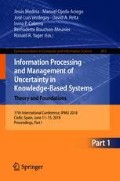Abstract
In the context of post-hoc interpretability, this paper addresses the task of explaining the prediction of a classifier, considering the case where no information is available, neither on the classifier itself, nor on the processed data (neither the training nor the test data). It proposes an inverse classification approach whose principle consists in determining the minimal changes needed to alter a prediction: in an instance-based framework, given a data point whose classification must be explained, the proposed method consists in identifying a close neighbor classified differently, where the closeness definition integrates a sparsity constraint. This principle is implemented using observation generation in the Growing Spheres algorithm. Experimental results on two datasets illustrate the relevance of the proposed approach that can be used to gain knowledge about the classifier.
Access this chapter
Tax calculation will be finalised at checkout
Purchases are for personal use only
References
Adler, P., Falk, C., Friedler, S.A., Rybeck, G., Scheidegger, C., Smith, B., Venkatasubramanian, S.: Auditing black-box models for indirect influence. In: 2016 IEEE 16th International Conference on Data Mining (ICDM), pp. 1–10 (2016)
Alonso, J., Magdalena, L.: Special issue on interpretable fuzzy systems. Inf. sci. 181(20) (2011)
Alonso, J.M., Castiello, C., Mencar, C.: Interpretability of fuzzy systems: current research trends and prospects. In: Kacprzyk, J., Pedrycz, W. (eds.) Springer Handbook of Computational Intelligence, pp. 219–237. Springer, Heidelberg (2015). https://doi.org/10.1007/978-3-662-43505-2_14
Baehrens, D., Schroeter, T., Harmeling, S., Kawanabe, M., Hansen, K., Mueller, K.R.: How to explain individual classification decisions. J. Mach. Learn. Res. 11, 1803–1831 (2009)
Barbella, D., Benzaid, S., Christensen, J., Jackson, B., Qin, X.V., Musicant, D.: Understanding support vector machine classifications via a recommender system-like approach. In: Proceedings of the International Conference on Data Mining, pp. 305–311 (2009)
Biran, O., Cotton, C.: Explanation and justification in machine learning: a survey. In: International Joint Conference on Artificial Intelligence Workshop on Explainable Artificial Intelligence (IJCAI-XAI) (2017)
Doshi-Velez, F., Kim, B.: Towards a rigorous science of interpretable machine learning. arXiv preprint 1702.08608 (2017)
Fernandes, K., Vinagre, P., Cortez, P.: A proactive intelligent decision support system for predicting the popularity of online news. In: Pereira, F., Machado, P., Costa, E., Cardoso, A. (eds.) EPIA 2015. LNCS (LNAI), vol. 9273, pp. 535–546. Springer, Cham (2015). https://doi.org/10.1007/978-3-319-23485-4_53
Gacto, M., Alcal, R., Herrera, F.: Interpretability of linguistic fuzzy rule-based systems: an overview of interpretability measures. Inf. Sci. 181(20), 4340–4360 (2011). Special issue on interpretable fuzzy systems
van Gog, T., Kester, L., Paas, F.: Effects of worked examples, example-problem, and problem-example pairs on novices’ learning. Contemp. Educ. Psychol. 36(3), 212–218 (2011)
Harman, R., Lacko, V.: On decompositional algorithms for uniform sampling from n-spheres and n-balls. J. Multivar. Anal. 101(10), 2297–2304 (2010)
Hendricks, L.A., Akata, Z., Rohrbach, M., Donahue, J., Schiele, B., Darrell, T.: Generating visual explanations. In: Leibe, B., Matas, J., Sebe, N., Welling, M. (eds.) ECCV 2016. LNCS, vol. 9908, pp. 3–19. Springer, Cham (2016). https://doi.org/10.1007/978-3-319-46493-0_1
Kabra, M., Robie, A., Branson, K.: Understanding classifier errors by examining influential neighbors. In: Proceedings of the IEEE Computer Society Conference on Computer Vision and Pattern Recognition, pp. 3917–3925 (2015)
Kim, B., Doshi-Velez, F.: Interpretable machine learning: the fuss, the concrete and the questions. In: ICML Tutorial on Interpretable Machine Learning (2017)
Krause, J., Perer, A., Bertini, E.: Using visual analytics to interpret predictive machine learning models. In: ICML Workshop on Human Interpretability in Machine Learning, pp. 106–110 (2016)
Lash, M.T., Lin, Q., Street, W.N., Robinson, J.G.: A budget-constrained inverse classification framework for smooth classifiers. In: 2017 IEEE International Conference on Data Mining Workshops (ICDMW17) (2017)
LeCun, Y., Bottou, L., Bengio, Y., Haffner, P.: Gradient-based learning applied to document recognition. Proc. IEEE 86, 2278–2324 (1998)
Mannino, M.V., Koushik, M.V.: The cost minimizing inverse classification problem: a genetic algorithm approach. Decis. Support Syst. 29(3), 283–300 (2000)
Martens, D., Provost, F.: Explaining data-driven document classifications. Mis Q. 38(1), 73–99 (2014)
Mvududu, N., Kanyongo, G.Y.: Using real life examples to teach abstract statistical concepts. Teach. Stat. 33(1), 12–16 (2011)
Ribeiro, M.T., Singh, S., Guestrin, C.: Why should I trust you? In: Proceedings of the 22nd ACM SIGKDD International Conference on Knowledge Discovery and Data Mining - KDD 2016, pp. 1135–1144 (2016)
Štrumbelj, E., Kononenko, I., Robnik Šikonja, M.: Explaining instance classifications with interactions of subsets of feature values. Data and Knowl. Eng. 68(10), 886–904 (2009)
Tygar, J.D.: Adversarial machine learning. IEEE Internet Comput. 15(5), 4–6 (2011)
Watson, A., Shipman, S.: Using learner generated examples to introduce new concepts. Educ. Stud. Math. 69(2), 97–109 (2008)
Acknowledgements
This work has been done as part of the Joint Research Initiative (JRI) project “Interpretability for human-friendly machine learning models” funded by the AXA Reseach Fund.
Author information
Authors and Affiliations
Corresponding author
Editor information
Editors and Affiliations
Rights and permissions
Copyright information
© 2018 Springer International Publishing AG, part of Springer Nature
About this paper
Cite this paper
Laugel, T., Lesot, MJ., Marsala, C., Renard, X., Detyniecki, M. (2018). Comparison-Based Inverse Classification for Interpretability in Machine Learning. In: Medina, J., et al. Information Processing and Management of Uncertainty in Knowledge-Based Systems. Theory and Foundations. IPMU 2018. Communications in Computer and Information Science, vol 853. Springer, Cham. https://doi.org/10.1007/978-3-319-91473-2_9
Download citation
DOI: https://doi.org/10.1007/978-3-319-91473-2_9
Published:
Publisher Name: Springer, Cham
Print ISBN: 978-3-319-91472-5
Online ISBN: 978-3-319-91473-2
eBook Packages: Computer ScienceComputer Science (R0)

